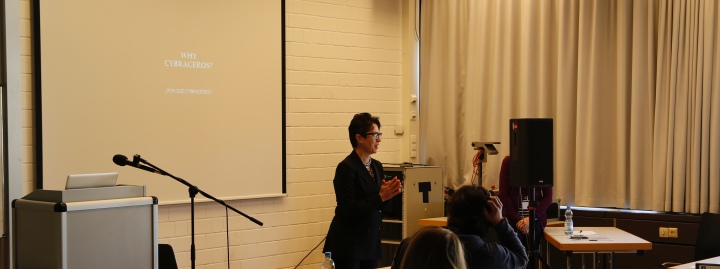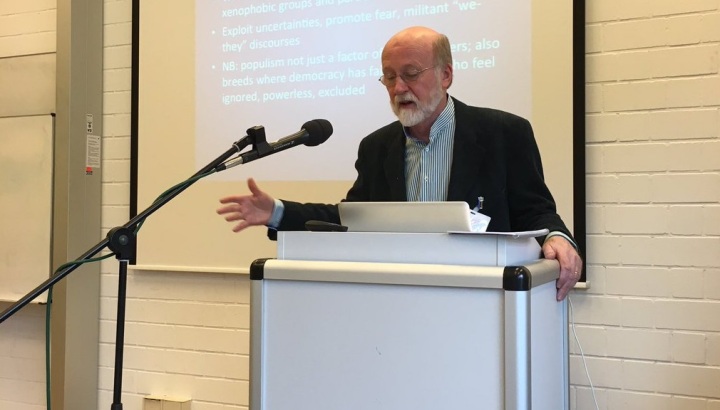
Literature and recent publications:
Teaching Transnational Cinema: Politics and Pedagogy. Eds. Katarzyna Marciniak and Bruce Bennett. AFI Film Readers Series. Series Editors: Edward Branigan and Chuck Wolfe. New York: Routledge (2016).
Immigrant Protest: Politics, Aesthetics, and Everyday Dissent. Eds. Katarzyna Marciniak and Imogen Tyler. Praxis: Theory in Action Series. Series Editor: Nancy Naples. New York: SUNY Press (2014).
Protesting Citizenship: Migrant Activisms. Eds. Imogen Tyler and Katarzyna Marciniak. New York: Routledge (reprint of the special issue for Citizenship Studies, “Immigrant Protest,” 2014).
Streets of Crocodiles: Photography, Media, and Postsocialist Landscapes in Poland (photography by Kamil Turowski, Introduction by J. Hoberman). Bristol: Intellect, November 2010).
Transnational Feminism in Film and Media (co-edited with Aniko Imre and Aine O’Healy). Comparative Feminist Studies Series (Palgrave, 2007, paperback 2011).
Alienhood: Citizenship, Exile and the Logic of Difference (University of Minnesota Press, 2006). Book nominated by the Press for the 2007 Katherine S. Kovacs Book Award for Outstanding Scholarship in Film and Media.
Series Editorship
Series Editor of Global Cinema for Palgrave Macmillan (with Anikó Imre and Áine O’Healy, since September 2010).
Journal Editorship
Guest-editorship, Special Issue: Citizenship Studies, co-edited with Imogen Tyler. Issue Topic: “Immigrant Protest,” vol. 17:2 (2013).
Guest-editorship, Special Issue: Feminist Media Studies, co-edited with Anikó Imre and Áine O’Healy. Issue Topic: “Transcultural Mediations and Transnational Politics of Difference,” vol. 9:4 (2009).
Journal Articles
“Legal/Illegal: Protesting Citizenship in Fortress America,” Immigrant Protest. Special issue of Citizenship Studies 17:2 (2013): 260-277.
“Immigrant Protest,” Introduction to the special issue (with Imogen Tyler),Citizenship Studies 17:2 (2013): 143-156.
“Pedagogy of Anxiety,” Signs: Journal of Women in Culture and Society 35:4 (2010): 869-892 (winner of the 2010 MLA Florence Howe Award for Outstanding Feminist Scholarship).
“Transcultural Mediations and Transnational Politics of Difference,” Introduction to the special issue (with Anikó Imre and Áine O’Healy), Feminist Media Studies9:4 (2009): 385-390.
“Postsocialist Hybrids,” Media Globalization and Postsocialist Identities. Special issue of European Journal of Cultural Studies 12:2 (2009): 173-190.
“Foreign Women and Toilets,” Feminist Media Studies 8:4 (2008): 337-356. [reprinted in Polish: “‘Obce’ i ubikacje,” trans. Michał Szczubiałka, Panoptikum8:15 (2009): 61-82.]
“How Does Cinema Become Lost? The Spectral Power of Socialism,” Via Transversa: Lost Cinema of the Former Eastern Bloc. Special issue of Koht ja paik / Place and Location: Studies in Environmental Aesthetics and Semiotics VII (2008): 15-28.
„Immigrant Rage: Alienhood, ‚Hygienic‘ Identities, and the Second World,“ Differences: A Journal of Feminist Cultural Studies 17:2 (2006): 33-63.
“New Europe: Eyes Wide Shut,” Emerging Subjects of Neoliberal Global Capitalism. Special issue of Social Identities: Journal for the Study of Race, Nation and Culture 12:5 (2006): 615-633.
„Transnational Anatomies of Exile and Abjection in Milcho Manchevski’s Before the Rain,“ Cinema Journal 43:1 (2003): 63-84.
„Cinematic Exile: Performing the Foreign Body on Screen in Roman Polański’s The Tenant,“ Camera Obscura: A Journal of Feminism, Culture, and Media Studies 43:1 (2000): 1-43.
Prof. Dr. Katarzyna Marciniak’s website



